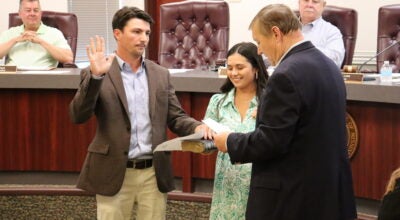Faith based addiction recovery organization continues to grow
Published 7:00 am Wednesday, June 26, 2019
A local organization that assists people dealing with addiction in their recovery, finding housing and finding employment has opened three houses for recovery transition since March, said Rescue Army founder Sarrah Willhite.
Willhite began the faith based recovery mission 18 months ago because of her own experiences with addiction and the high rate of addiction in Pearl River County, she said.
Rescue Army does not view addiction as a disease, Willhite said, and tries to frame people in recovery as survivors, not victims of their addiction. Twenty to 30 volunteers staff the organization and it is self funded, Willhite said. The organization began with and continues to do evangelism and recovery classes, Willhite said.
Rescue Army opened a shelter for women in March, for women and children in April and for men in May, Willhite said.
The houses give residents a place to stay for six months to a year, Willhite said and offer employment help, counseling and discipleship. Residents often come to Rescue Army in a moment of crisis, Willhite said, such as after an eviction when they have no place to stay or after an encounter with law enforcement.
Sheriff David Allison said that his department calls Rescue Army to speak with people who are not being arrested for a crime but are struggling with a drug problem.
The houses—known as the women’s and men’s barracks—have eight to nine beds, Willhite said. People staying in the homes pay the organization $100 per week for housing after they find a job, and Rescue Army gives them transportation to work, Willhite said.
Along with a primary job that pays their expenses, residents work in one of the organizations’ businesses, which currently include a Christian bookstore and a landscaping business with plans to open a café soon, Willhite said.
Residents cannot access their wages from their work at the organization’s businesses until after they complete the program, Willhite said. Instead those wages are put in a savings account for them, which they can access after they graduate from the program in order to give them more motivation to work toward recovery, she said.
Women’s house leader Linda Mcvea said the organization helps people with things that are simple for many, like opening a checking account.
Clint Parker, one of the two leaders in the men’s barracks, said residents pray together and support one another. Parker said men are asked to do chores in the home, not told to do them, because there is a better response that way.
Mcvea said this is the third recovery home she has worked in and believes the previous experiences were training for her work with Rescue Army. Mcvea said she began working with Rescue Army because God gave her a vision long ago, asking her to help a young girl over a mountain and she believes Willhite is the girl she is meant to help.
The next project for Rescue Army is an infirmary, Willhite said. It will be a space with eight beds for people to detox before going to the recovery transition homes, Willhite said. The space will offer ministers, prayer teams, 24/7 worship music and a healing atmosphere, Willhite said.




